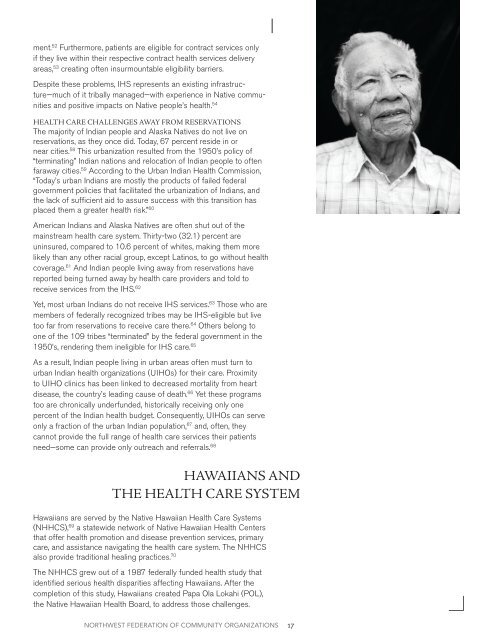An American Debt Unpaid: Stories of Native Health - Alliance for a ...
An American Debt Unpaid: Stories of Native Health - Alliance for a ...
An American Debt Unpaid: Stories of Native Health - Alliance for a ...
Create successful ePaper yourself
Turn your PDF publications into a flip-book with our unique Google optimized e-Paper software.
ment. 52 Furthermore, patients are eligible <strong>for</strong> contract services onlyif they live within their respective contract health services deliveryareas, 53 creating <strong>of</strong>ten insurmountable eligibility barriers.Despite these problems, IHS represents an existing infrastructure—much<strong>of</strong> it tribally managed—with experience in <strong>Native</strong> communitiesand positive impacts on <strong>Native</strong> people’s health. 54<strong>Health</strong> care challenges away from reservationsThe majority <strong>of</strong> Indian people and Alaska <strong>Native</strong>s do not live onreservations, as they once did. Today, 67 percent reside in ornear cities. 58 This urbanization resulted from the 1950’s policy <strong>of</strong>“terminating” Indian nations and relocation <strong>of</strong> Indian people to <strong>of</strong>tenfaraway cities. 59 According to the Urban Indian <strong>Health</strong> Commission,“Today’s urban Indians are mostly the products <strong>of</strong> failed federalgovernment policies that facilitated the urbanization <strong>of</strong> Indians, andthe lack <strong>of</strong> sufficient aid to assure success with this transition hasplaced them a greater health risk.” 60<strong>American</strong> Indians and Alaska <strong>Native</strong>s are <strong>of</strong>ten shut out <strong>of</strong> themainstream health care system. Thirty-two (32.1) percent areuninsured, compared to 10.6 percent <strong>of</strong> whites, making them morelikely than any other racial group, except Latinos, to go without healthcoverage. 61 <strong>An</strong>d Indian people living away from reservations havereported being turned away by health care providers and told toreceive services from the IHS. 62Yet, most urban Indians do not receive IHS services. 63 Those who aremembers <strong>of</strong> federally recognized tribes may be IHS-eligible but livetoo far from reservations to receive care there. 64 Others belong toone <strong>of</strong> the 109 tribes “terminated” by the federal government in the1950’s, rendering them ineligible <strong>for</strong> IHS care. 65As a result, Indian people living in urban areas <strong>of</strong>ten must turn tourban Indian health organizations (UIHOs) <strong>for</strong> their care. Proximityto UIHO clinics has been linked to decreased mortality from heartdisease, the country’s leading cause <strong>of</strong> death. 66 Yet these programstoo are chronically underfunded, historically receiving only onepercent <strong>of</strong> the Indian health budget. Consequently, UIHOs can serveonly a fraction <strong>of</strong> the urban Indian population, 67 and, <strong>of</strong>ten, theycannot provide the full range <strong>of</strong> health care services their patientsneed—some can provide only outreach and referrals. 68HAWAIIANS ANDTHE HEALTH CARE SYSTEMHawaiians are served by the <strong>Native</strong> Hawaiian <strong>Health</strong> Care Systems(NHHCS), 69 a statewide network <strong>of</strong> <strong>Native</strong> Hawaiian <strong>Health</strong> Centersthat <strong>of</strong>fer health promotion and disease prevention services, primarycare, and assistance navigating the health care system. The NHHCSalso provide traditional healing practices. 70The NHHCS grew out <strong>of</strong> a 1987 federally funded health study thatidentified serious health disparities affecting Hawaiians. After thecompletion <strong>of</strong> this study, Hawaiians created Papa Ola Lokahi (POL),the <strong>Native</strong> Hawaiian <strong>Health</strong> Board, to address those challenges.NORTHWEST FEDERATION OF COMMUNITY ORGANIZATIONS 17




